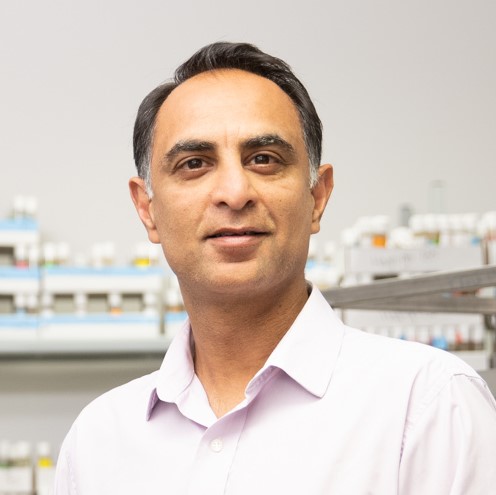by Buck Institute
May 9, 2024 . News
The Buck’s Impact Circle will support a clinical trial aimed at lowering glycation to slow the aging process

 The Buck’s Impact Circle donor group will support a clinical trial to test the effects of a glycation-lowering supplement on improving glucose metabolism, slowing aging, and reducing body weight. The group’s $100,000 donation was awarded to Professor Pankaj Kapahi, PhD who focuses on glycation in his lab, and assistant professor John Newman, MD, PhD, who has been instrumental in setting up the Buck’s new clinical research unit.
The Buck’s Impact Circle donor group will support a clinical trial to test the effects of a glycation-lowering supplement on improving glucose metabolism, slowing aging, and reducing body weight. The group’s $100,000 donation was awarded to Professor Pankaj Kapahi, PhD who focuses on glycation in his lab, and assistant professor John Newman, MD, PhD, who has been instrumental in setting up the Buck’s new clinical research unit.
“This project is very special to me, and I am extremely grateful to the Impact Circle for their support,” said Kapahi, who came to the Buck in 2004, establishing a lab that studies nutrient signaling in the context of aging and disease. “In those early years, the lab worked just in flies and worms. I never thought that what we were working on would be able to be tested in terms of human health. I am so excited to move our research into people, which has largely been made possible by the efforts of Dr. Newman and Dr. Brianna Stubbs in setting up the clinical research center at the Buck”.
The double-blind placebo-controlled trial is dubbed GAP for Glylo Aging Pilot and is seeking additional major funding from the National Institute on Aging. The trial will initially involve 30 individuals who will take the supplement over 12 weeks to six months. Researchers hope to determine the supplement’s impact on metabolic markers including AGEs, fasting glucose, and insulin resistance, which increases with age, as well as age-related functional decline and biomarkers of aging. The clinical trial will be led by Drs. Newman and Stubbs, and recruitment could begin as early as the fall.
GAP is aimed at managing advanced glycation end products (AGEs) which are toxic molecules formed when proteins, DNA, and fats become bound after exposure to sugar. AGEs are found in some of the foods we eat, but are also made endogenously in our cells. AGEs affect nearly every cell type and our bodies have inherent defense mechanisms that can clear them, but those mechanisms decline with age. AGEs cause chronic inflammation and contribute to obesity and metabolic syndrome. They have long been implicated in type 2 diabetes and are linked to its complications. AGEs are now seen as potential players in neurodegeneration. The molecular damage from AGEs is irreversible and some of us are likely to be genetically prone to develop more of them, no matter what we eat.
The supplement includes a combination of glycation-lowering compounds that have been shown to slow aging and neurodegeneration when administered individually both in mice and humans. The combination (which consists of lipoic acid, nicotinamide, pyridoxine, thiamine, and piperine) lowered glycation and aging-related stress during preclinical studies in mice. “Our central hypothesis is that treatment with the supplement will slow aging by targeting multiple known longevity pathways to improve human healthspan,” said Kapahi.
The Impact Circle
Established in 2014, the Impact Circle is a peer group of like-minded philanthropists who advance scientific discovery at the Buck by pooling their resources to provide seed money for early-stage projects. In addition to the satisfaction of supporting ground-breaking research (and tracking its success), they also get a front row seat in learning about the scientific process. Previous awards have focused on efforts to support brain resilience, the role of oxytocin in aging, and exploring whether extremely long-lived queen honeybees can inform research on human aging.
Ron Mallory and his wife Amanda joined the Impact Circle last year because they wanted to do something more significant to support the Buck. The retired CPA who lives with his wife in Pt. Reyes Station says he was excited to support early-stage research and was glad that Kapahi won the award. “While all of the Impact Circle contenders had worthy projects, the fact that Dr. Kapahi’s project is poised to move into human trials pretty quickly was very compelling for both of us.” Membership in the Impact Circle remains open. Those interested should contact Lisa Palma, Director of Philanthropy, at lpalma@buckinstitute.org.
DISCLOSURE: Dr. Kapahi owns stock in Juvify Bio, the company that has commercialized GLYLO. He is also an inventor on patents that relate to the product being studied. The Buck Institute also has an ownership interest in Juvify Bio.
Science is showing that while chronological aging is inevitable, biological aging is malleable. There's a part of it that you can fight, and we are getting closer and closer to winning that fight.
Eric Verdin, MD, Buck Institute President and CEO